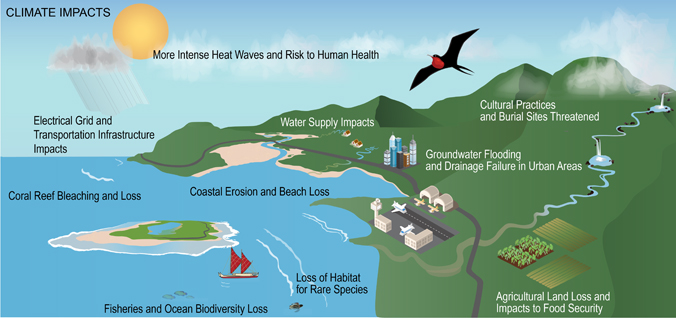
Strained freshwater supplies, damaged and compromised coastal infrastructure, coral reef death and greater stresses on native biodiversity and species are among the major concerns and challenges detailed in the Hawaiʻi-Pacific Islands chapter of the Volume II of the Fourth official U.S. National Climate Assessment, released on November 23. In Hawaiʻi, the value of all structures and land expected to be flooded by 2100 amounts to more than $19 billion statewide.
The Hawaiʻi-Pacific Islands chapter authors are East-West Center’s Victoria Keener and Zena Grecni, University of Hawaiʻi at Mānoa’s Maxine Burkett, Chip Fletcher, Tom Giambelluca and Malia Nobrega-Olivera, and NOAA’s Jeff Polovina.
“This report makes it clear that climate change has arrived far sooner and as a greater threat than we previously thought,” said Keener, the chapter’s regional lead. “Here on Oʻahu, we already see road closures during morning rush hour because of flooding, and with sea level rise we’ll see this more and more. Our Pacific Island neighbors on atolls will face sustainability challenges sooner rather than later. The world’s largest insurers recently stated that climate change is creating an ‘uninsurable’ world. Only by acting now can we hope to effectively manage these risks.”
Volume II of the Fourth National Climate Assessment is the most significant U.S. report to assess the effects of climate change on the U.S. economy and communities. The assessment finds that early action to address these impacts can lower economic, environmental, social, and cultural costs, and could help to prevent conflict or displacement from lands and resources.
The chapter on Hawaiʻi and the U.S.-affiliated Pacific Islands lays out the changes already being felt in Hawaiʻi and Pacific Islands, as well as what lies ahead. Top findings include:
- Dependable and safe water supplies are threatened.
- Sea level rise has accelerated and is now damaging critical infrastructure.
- Increasing ocean temperatures and acidification threaten fisheries, coral reefs and the livelihoods they support.
- These changes imperil indigenous peoples’ health and well-being.
- Climate change reduces the ability of habitats to support protected plant and animal species.
Read more about the study and its impact on Hawaiʻi from the East-West Center.

